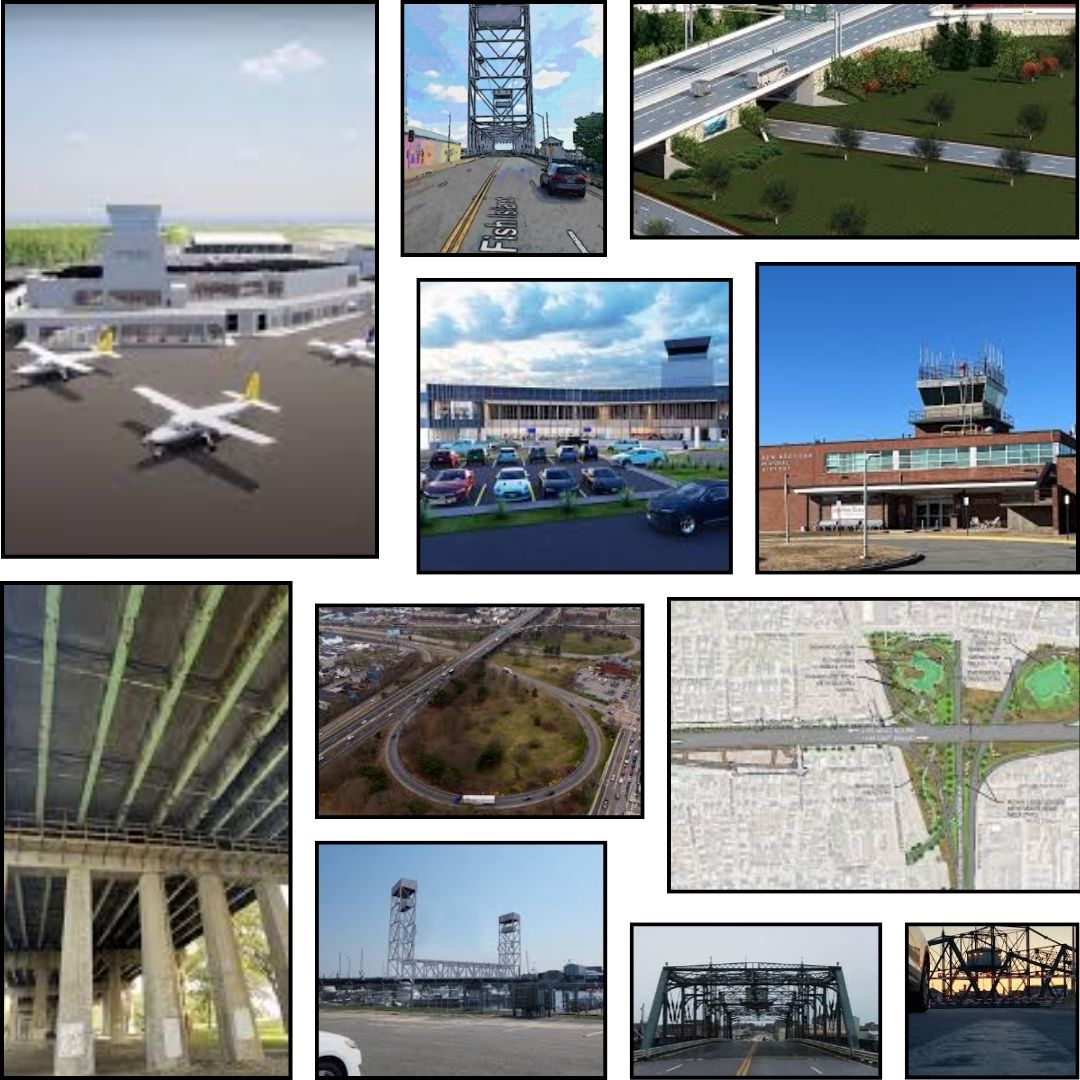Over the last several years, the Massachusetts Department of Transportation (MassDOT) and the City of New Bedford have unveiled numerous transportation projects that aim to improve infrastructure and increase regional connectivity. The projects, which are of varying scale and complexity, range from rebuilding roads and bridges to a complete overhaul of the New Bedford Regional Airport. While most of these projects take place directly in New Bedford, those living in the surrounding communities of Greater New Bedford will also benefit from the projects as the city continues to become the economic hub of the South Coast.
Additionally, these improvements come at a time when New Bedford is experiencing economic diversification, which can be seen with the city’s investment in the budding offshore wind industry in the United States. As a result, these projects will enhance the marketability of the area for continued economic growth. Residents and visitors of the local area will not only benefit from improved functionality, but will also experience the aesthetic enhancements that these projects will bring.
These important investments by the state are developing in large part due to the fact that New Bedford is recognized as a gateway city. The Commonwealth of Massachusetts classifies New Bedford with this distinction, along with 25 other cities around the state, based on a report done by MassINC and the Brookings Institute. By definition this means the city is a “midsize urban center that anchors regional economies” and furthermore, in the past, once offered “Americans good jobs and a gateway to the American Dream.” In other words, the gateway cities are communities in Massachusetts that have great economic potential but face socio economic problems. This includes issues such as high crime rates, homelessness, and underinvestment by both the private and public sectors. The gateway city initiative works in partnership with these communities to support revitalization efforts. New Bedford was added to the list of gateway cities in 2007.
This is why, in the past, New Bedford has also been the site of major infrastructure projects. One of these projects was the redevelopment of Route 18, also known presently as JFK Memorial Boulevard, which cuts through the downtown area from Elm Street to Cove Street. In 2012 and 2019, this stretch of highway—which was formerly impassable for pedestrians—was transformed into a vibrant, aesthetically appealing urban boulevard. The project was completed in two stages: phase one from Elm Street to Walnut Street in 2012, and phase two from Walnut Street to Cove Road in 2019.
The projects currently proposed by MassDOT have similar goals to the Route 18 redevelopment project: improve infrastructure to better serve the people who live in and around the New Bedford area, and position New Bedford to continue economic development efforts. Additionally, these improvements are set to work in tandem with the recently completed South Coast Rail project, which restored rail service to Boston for the first time in 50 years. Here is a look at some of the proposed projects.
The New Bedford-Fairhaven Bridge
One of the larger items lined up to be redeveloped by MassDOT is the New Bedford-Fairhaven Bridge. Completed in 1903, the current swing bridge is well over 100 years old. Although major restorations have taken place on the bridge over the past 122 years, including being completely rebuilt in 1997, the current bridge design no longer serves the needs of New Bedford’s evolving maritime economy. This is because, with New Bedford’s growing influence in the developing offshore wind industry, larger boats now need to access the upper harbor and the century-old swing bridge does not allow for this. The bridge does not accommodate larger boats because when the current bridge rotates a narrow navigational channel is created which is not wide enough for the larger boats that now need to pass through.
To remedy this, MassDOT has proposed to replace the existing bridge with a vertical lift bridge that is expected to give ships 150 feet of vertical clearance—and, most importantly, the proposed bridge would widen the horizontal space in the navigational channel from roughly 95 feet to 270 feet. Currently, MassDOT expects to begin construction of the new bridge in 2028 and it is estimated to cost between $100 and $130 million.
I-195 Viaduct Replacement
In another consequential move by MassDOT, the I-195 interchange in New Bedford that carries traffic over Route 18 is set for a complete reconstruction. A viaduct is a large bridge structure usually constructed with a set of arches.
The current superstructure cuts straight through the heart of the city; as a result, MassDOT, in partnership with the City of New Bedford, has been very intentional in the design process. The current redesign calls for a sleeker, more aesthetically appealing structure and surrounding area below. Improved lighting, drainage, and foliage are all things planned for the project. In the end, MassDOT hopes the new structure will better act as a gateway to the city and the rest of Southeastern Massachusetts. The project will begin sometime this summer and will take roughly five years to complete. In total the estimated cost of the project is $400 million.
New Bedford Regional Airport Upgrades
In Massachusetts there are nine airports around the state designated for commercial use. New Bedford Regional Airport is one of those on the list. However, the current terminal in use opened in 1951 and is outdated. MassDOT and the City of New Bedford have sought for many years in multiple efforts to revitalize and upgrade the airport. Some of these proposals over the years have included extending the runway and upgrading facilities; although each time these plans have run into a variety of problems and never came to fruition. Concerns over wetland protections and the impacts on abutters as a result of increased use have hampered the plans in the past.
Despite these setbacks, the state and the city are committed to revitalizing New Bedford Regional Airport into a driver of the local economy. To accomplish this, the city has begun the design and planning process for the new airport facilities. This includes a new terminal, tower, and upgraded road infrastructure. In support of this, the Healy-Driscoll Administration has awarded New Bedford grants worth $1.2 million to begin improving service roads. In total, the project to redevelop the airport is expected to cost $76 million and be fully completed by December 2028.













